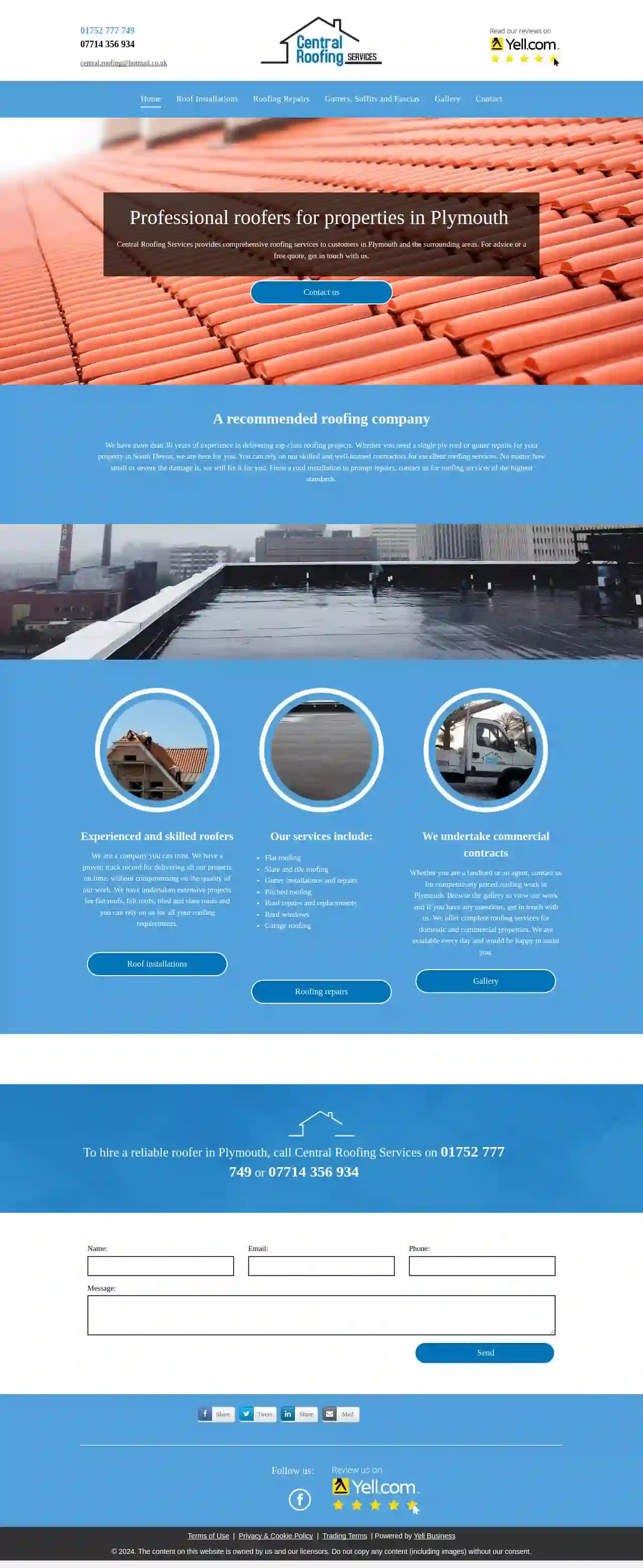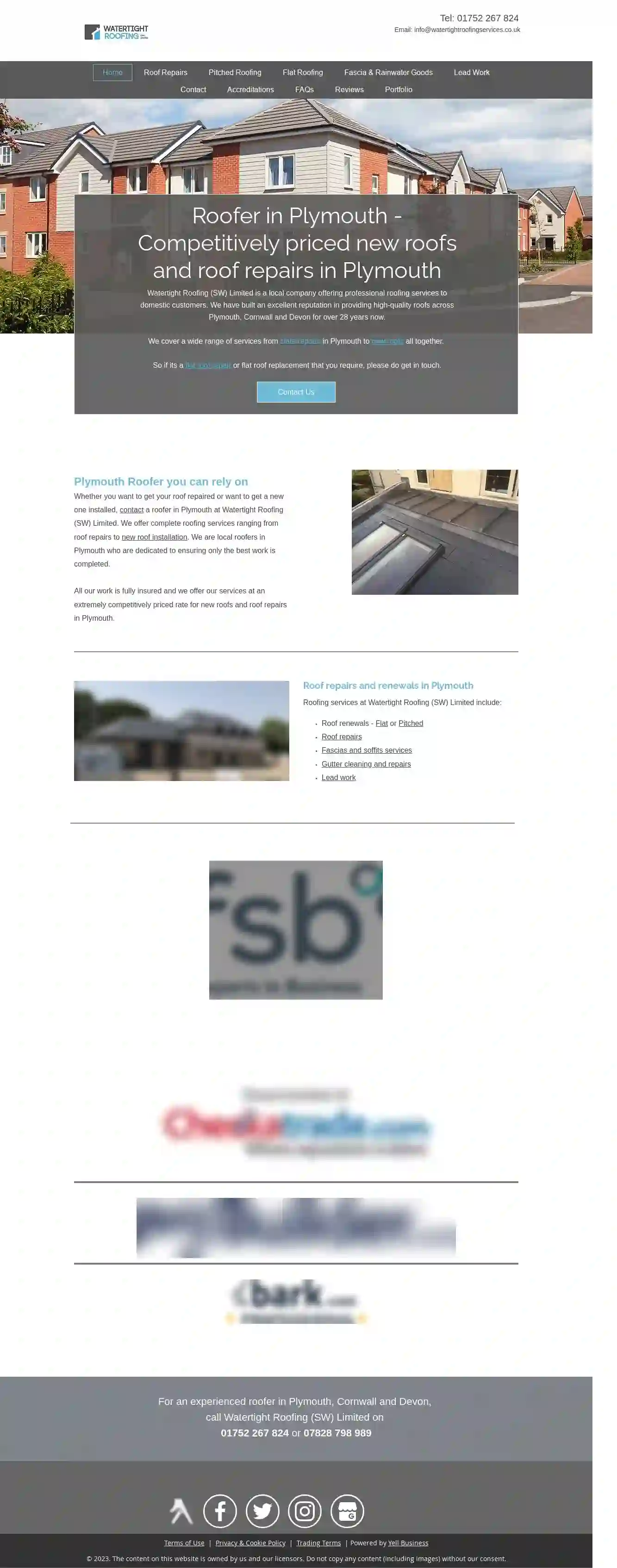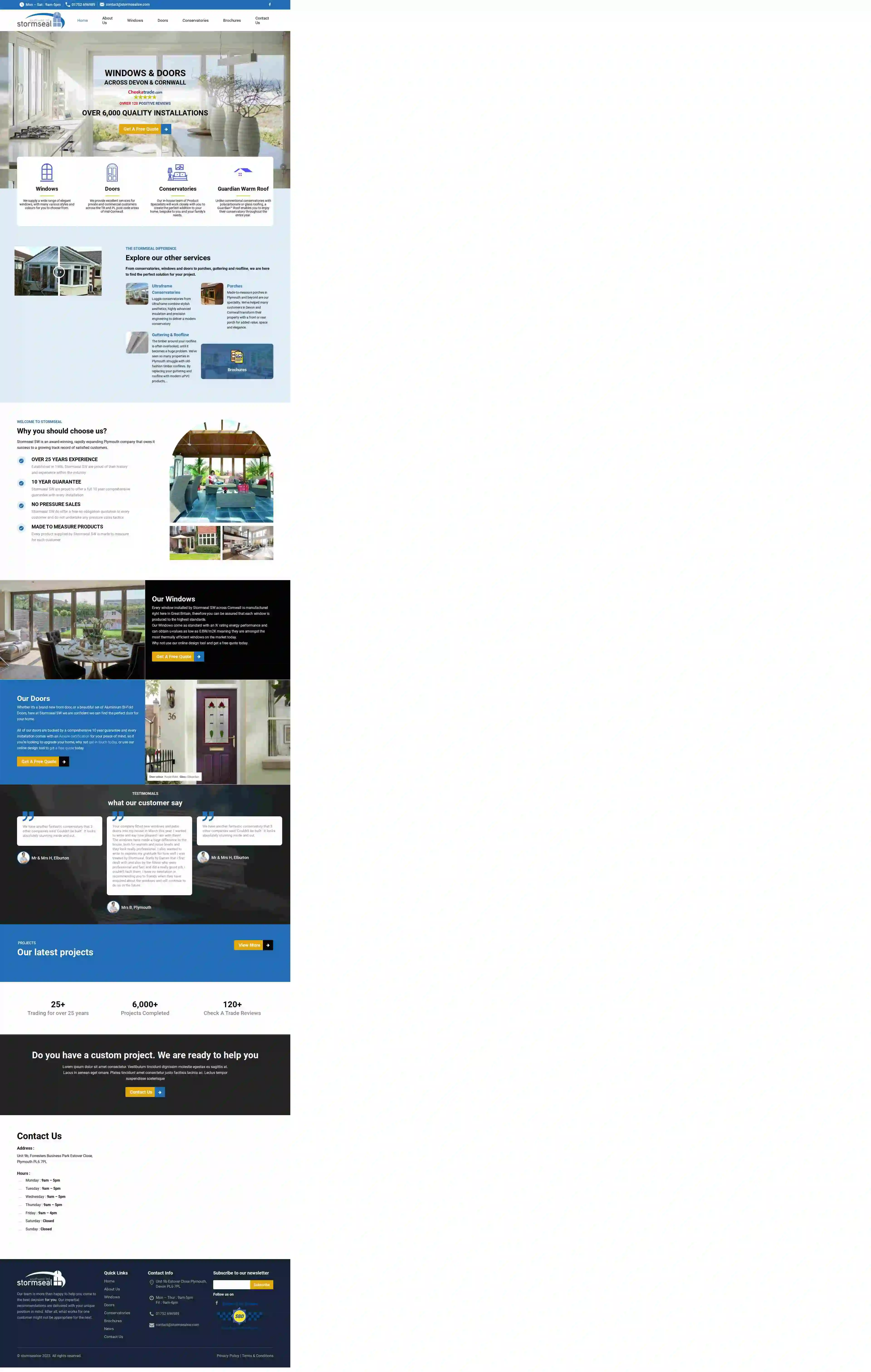Commercial Roofers Plymouth
Top Commercial Roofers in Plymouth
Receive up to 3 Commercial Roofers quotes for your project today! Compare profiles, reviews, accreditations, portfolio, etc... and choose the best service.

Central Roofing Services
24 reviews23 Shirburn Road, Eggbuckland, PL6 5PG, GBCentral Roofing Services is a well-established roofing company based in Plymouth, serving both domestic and commercial clients in the surrounding areas. With over 30 years of experience, we offer a comprehensive range of roofing services, from new installations to repairs and maintenance. Our team of skilled and experienced roofers is dedicated to providing high-quality workmanship and exceptional customer service. We pride ourselves on delivering projects on time and within budget, without compromising on quality. Whether you need a single-ply roof, slate and tile roofing, gutter installations, or any other roofing service, Central Roofing Services is your trusted partner. Contact us today for a free quote and let us take care of all your roofing needs.
- Services
- Why Us?
- Gallery
Get Quote
First Choice Roofing Plymouth - Mark Cunningham
530 reviewsPlymouth, PL1 1AA, GBFirst Choice Roofing Plymouth, led by Mark Cunningham, is your trusted partner for top-tier, first class roofing solutions. With years of experience, Mark, his son Reece and team have perfected the art of protecting your home. Our skilled team ensures your peace of mind through quality craftsmanship, using premium materials, and delivering exceptional customer service. From repairs to installations, we cover it all, making us the first choice for all your roofing needs in Plymouth. Our values are to: Provide a professional service Ensure full risk assessment and health and safety requirements are met at all times Use quality products and equipment Maintain our knowledge and skills Utilise our years of experience to work with our customers and plan their roofing needs together. You can access a full roof inspection with a non-obligation quote, for all your roofing needs: Roof Replacements – Slating and Tiling Flat Roofs Emergency Repairs Roof Leaks and Repair Work Guttering and Fascia’s Chimneys Plastered, Demolished or Repaired Leadwork and Flashing Skylight Installation and Velux Windows Fortex UPVC Cladding Firewall Repairs Fibreglass Roofing A committed, dedicated and professional team who pride themselves on perfectionism.With a portfolio of completed work and extensive customer feedback, we can demonstrate years of experience and help ensure you are confident of putting your trust in us.
- Services
- Why Us?
- Our Team
- Testimonials
- Gallery
Get Quote
Watertight Roofing (SW) Ltd
515 reviewsGBWatertight Roofing (SW) Limited is a local company offering professional roofing services to both domestic and commercial customers. We have built an excellent reputation in providing high-quality roofs and repairs across Plymouth, Cornwall and Devon for over 28 years now. We cover a wide range of services from slate repairs to complete new roofs. So if it's a flat roof repair or replacement that you require, a tile repair or new guttering and fascias, please do get in touch. For more information on the services we offer, please look at our website or search for us on Facebook.
- Services
- Why Us?
- Gallery
Get Quote
Paul Smoker Roofing Ltd
3.614 reviewsPlymouth, 350 Blandford Road, PL3 6HZ, GBWelcome to Paul Smoker Roofing Ltd, an award-winning roofer in Plymouth. We are a proud Which? Trusted Trader roofer who offer a full range of roofing services, with the ethos of delivering an exceptional service at the best value possible. So much so, that the majority of our roofing work comes from our loyal existing customers and their many referrals. Paul Smoker Roofing Ltd has many years experience, providing a professional, trusted and reliable service, specialising in all aspects of roofing at competitive rates. We are proud to be associated with Which? Trusted Trader, Checkatrade, MyBuilder, Rated People, FindaTrade and BookaBuilder. Based in Plymouth, we cover all of Devon and Cornwall. Top Quality With Paul Smoker Roofing Ltd we complete every project on time to the agreed price. Your job is our priority. Great Service We offer a national contractor service for local contractor prices – giving you excellent value for money! Dedicated Team A team of dedicated Which? Trusted Trader roofers who always go above and beyond for our customers. We are proud to be working with the following Companies Paul Smoker Roofing Ltd Need a roofer in Plymouth or surrounding areas? Paul Smoker Roofing Ltd, are an established, professional, reliable local roofing company who serve Plymouth, Devon and Cornwall. All our staff are fully trained and we have more than twenty years experience offering domestic and commercial customers a wide variety of roofing services. At Paul Smoker Roofing Ltd, we pride ourselves on quality roofing services. Whether a minor repair or a full re-roofing is required, we guarantee the highest quality workmanship at attractive and affordable prices.
- Services
- Why Us?
- Accreditations
- Our Team
- Testimonials
- Gallery
Get Quote
Stormforce Roofing & Maintenance Ltd
314 reviewsBergstrand House, Parkwood Close, Roborough, Plymouth, PL6 7SR, GBWelcome to Stormforce Roofing, celebrating two decades at the top as a commercial roofing contractor for clients including the Ministry of Defence, Devon & Somerset Fire and Rescue Service, NHS England, Devon County Council, Somerset County Council, Plymouth Community Homes and leading names in the construction industry. Whatever your roofing requirements, we’ve never found anything we can’t help our clients with. What’s more, at Stormforce it’s all about doing the best job we can, every time. We specialise in tiled roofs, flat roofs, pitch roofs, heritage roofs and environmentally friendly roof techniques. Using the latest drone roof surveying technology and high quality materials, our highly accredited and skilled team is ready to deliver for you on your next roofing project, scheduled repairs or maintenance programme. Stormforce Roofing is continuing to expand and has now moved into our new base in purpose built offices and stores on the outskirts of Plymouth. Along with the increased staffing levels and new vehicles the company continues to offer a service that is second to none across the entire Southern United Kingdom from Penzance to London including South Wales & the Channel Islands. We are proud to sponsor wonderful local organisations in our community.
- Services
- Why Us?
- Our Team
- Testimonials
- Gallery
Get Quote
Weathershield Roofing & Guttering Specialists Ltd
Unit 116, 91 Mayflower Street, Plymouth, PL1 1S, GBWeathershield Roofing & Guttering Specialists Ltd is a well-established roofing company based in the UK, with over a decade of experience in delivering unparalleled services. We pride ourselves on providing top-notch roofing solutions, from new installations to repairs, flat roofs, and guttering. Our team of skilled professionals is committed to excellence, offering a comprehensive range of services to meet diverse needs. We believe in transparency and honesty, providing free no-obligation estimates and competitive prices without compromising on quality. We are dedicated to delivering durable and high-quality solutions that stand the test of time. We operate throughout Plymouth, Torquay & Surrounding Areas, known for our friendly, professional, and dependable approach.
- Services
- Why Us?
- Gallery
Get Quote
ADS Roofline
GBDevon Roofing Network is a network of roofing professionals serving Ivybridge and surrounding areas. We offer a wide range of roofing services for both residential and commercial customers, including roof repairs, flat roofing, guttering, fascias & soffits, and more. Our members are experienced and qualified roofers who are committed to providing high-quality workmanship and customer service. We understand that your roof is a vital part of your home or business, and we take pride in providing reliable and durable solutions to protect your investment. Whether you need a small repair or a complete roof replacement, our team can help. Contact us today for a free quote.
- Services
- Why Us?
- Gallery
Get Quote
Pete Nicholls Roofing
56 reviewsGBPete Nicholls Roofing is a family run roofing business that has built an unrivalled reputation for roof installations and repairs all across the counties of Devon & Cornwall. Specialising in all aspects of the roofing trade and with 30 years of experience we really do have it covered. Whether you have a modern property needing the very latest in roof design, or have a roof that is hundreds of years old requiring restoration, we can complete your project to the highest standard. With a vast array of roofing work completed all over Devon, Cornwall and the South Hams from brand new roofing projects to the restoration of historic roofs such as Looe clock tower we are confident you will be delighted. We are also fully insured for your piece of mind so don't delay call us now for your free onsite survey and quotation.
- Services
- Why Us?
- Our Team
- Testimonials
- Gallery
Get Quote
Stormseal Southwest Ltd
413 reviewsUnit 9b, Forresters Business Park Estover Close, Plymouth, PL6 7PL, GBStormseal SW is an award-winning, rapidly expanding Plymouth company that owes its success to a growing track record of satisfied customers. Established in 1986, Stormseal SW are proud of their history and experience within the industry. They offer a full 10 year comprehensive guarantee with every installation and pride themselves on providing free, no obligation quotations with no pressure sales tactics. Every product supplied by Stormseal SW is made to measure for each customer. Stormseal SW supply a wide range of elegant windows, with many various styles and colours for you to choose from. They also provide excellent services for private and commercial customers across the TR and PL post code areas of mid-Cornwall. Our in-house team of Product Specialists will work closely with you to create the perfect addition to your home, bespoke to you and your family’s needs. Unlike conventional conservatories with polycarbonate or glass roofing, a Guardian™ Roof enables you to enjoy their conservatory throughout the entire year. From conservatories, windows and doors to porches, guttering and roofline, we are here to find the perfect solution for your project.
- Services
- Why Us?
- Gallery
Get Quote
T J Roofing Services
2.65 reviewsGBDevon Roofing Network is a network of roofing professionals serving Bigbury and surrounding areas. They offer a wide range of roofing services for both residential and commercial properties, including roof repairs, flat roofing, guttering, fascias & soffits, and more. The team emphasizes the importance of a well-built roof and highlights the potential damage that even small leaks can cause. They encourage homeowners to contact them for a free quote and advice on the condition of their roof. Devon Roofing Network also promotes their commitment to environmentally friendly roofing solutions, particularly EPDM rubber roofing, which they consider a more sustainable option compared to PVC.
- Services
- Why Us?
- Gallery
Get Quote
Over 12,314+ Roofers registered
Our roofing pros operate in Plymouth and surroundings!
Roofyng.co.uk has curated and vetted the Best Roofers in Plymouth. Find a top & trustworthy business today.
Commercial Roofing FAQs
- Leaks
- Structural damage
- Premature roof deterioration
- Proper Design and Installation: Ensure your roof has a sufficient slope for proper drainage during the design and construction phase.
- Regular Inspections and Maintenance: Inspect the roof regularly for clogged drains or debris buildup.
- Repair Sagging Areas: Address any sagging or low spots on the roof, as they can trap water.
- Tapered Insulation: Consider installing a tapered insulation system to create a gradual slope toward the drains.
- Proper Drainage: The curb elevates the unit above the roof surface, allowing water to drain away from the unit, preventing corrosion and potential damage.
- Waterproofing: The curb provides a solid base for flashing, ensuring a watertight seal around the unit's penetration point.
- Airflow: A properly designed curb allows for adequate airflow around the HVAC unit, improving its efficiency and preventing overheating.
- Maintenance Access: The curb provides a stable and accessible platform for maintenance personnel to service the HVAC unit.
- Regular Inspections: Schedule regular roof inspections, ideally twice a year, to identify potential problems early.
- Timely Repairs: Address any damage or leaks promptly.
- Debris Removal: Keep the roof clear of leaves, branches, and debris.
- Gutter Cleaning: Clean gutters and downspouts regularly.
- Snow Removal: In snowy regions, remove snow buildup to prevent excess weight and ice dams.
- Preventative Maintenance: Consider a roof maintenance plan that includes regular inspections, cleaning, and minor repairs.
- Building Type: The type of building, its size, and its intended use will influence the most suitable roofing material.
- Roof Slope: The roof's slope or pitch will determine the type of roofing system that can be installed and the drainage considerations.
- Budget: Different roofing materials have varying costs. Establish a clear budget for your project and consider the cost of materials, installation, and long-term maintenance.
- Durability and Lifespan: Assess the durability and expected lifespan of different roofing materials, considering factors like weather resistance, UV resistance, and foot traffic.
- Energy Efficiency: Choose materials with good insulation and reflectivity properties to reduce energy consumption and lower heating and cooling costs.
- Aesthetics: Consider the appearance of the roofing material and how it complements the building's design and surroundings.
- Fire Resistance: Prioritize fire-resistant materials, especially for buildings with specific fire safety requirements.
- Maintenance Requirements: Consider the ongoing maintenance needs of different materials. Some materials require more frequent cleaning or repairs than others.
How do I prevent ponding water on my commercial roof?
Why do I need a roof curb for my HVAC unit?
What are some tips for preventing roof damage on my commercial building?
How do I choose the right roofing material for my commercial building?
How do I prevent ponding water on my commercial roof?
- Leaks
- Structural damage
- Premature roof deterioration
- Proper Design and Installation: Ensure your roof has a sufficient slope for proper drainage during the design and construction phase.
- Regular Inspections and Maintenance: Inspect the roof regularly for clogged drains or debris buildup.
- Repair Sagging Areas: Address any sagging or low spots on the roof, as they can trap water.
- Tapered Insulation: Consider installing a tapered insulation system to create a gradual slope toward the drains.
Why do I need a roof curb for my HVAC unit?
- Proper Drainage: The curb elevates the unit above the roof surface, allowing water to drain away from the unit, preventing corrosion and potential damage.
- Waterproofing: The curb provides a solid base for flashing, ensuring a watertight seal around the unit's penetration point.
- Airflow: A properly designed curb allows for adequate airflow around the HVAC unit, improving its efficiency and preventing overheating.
- Maintenance Access: The curb provides a stable and accessible platform for maintenance personnel to service the HVAC unit.
What are some tips for preventing roof damage on my commercial building?
- Regular Inspections: Schedule regular roof inspections, ideally twice a year, to identify potential problems early.
- Timely Repairs: Address any damage or leaks promptly.
- Debris Removal: Keep the roof clear of leaves, branches, and debris.
- Gutter Cleaning: Clean gutters and downspouts regularly.
- Snow Removal: In snowy regions, remove snow buildup to prevent excess weight and ice dams.
- Preventative Maintenance: Consider a roof maintenance plan that includes regular inspections, cleaning, and minor repairs.
How do I choose the right roofing material for my commercial building?
- Building Type: The type of building, its size, and its intended use will influence the most suitable roofing material.
- Roof Slope: The roof's slope or pitch will determine the type of roofing system that can be installed and the drainage considerations.
- Budget: Different roofing materials have varying costs. Establish a clear budget for your project and consider the cost of materials, installation, and long-term maintenance.
- Durability and Lifespan: Assess the durability and expected lifespan of different roofing materials, considering factors like weather resistance, UV resistance, and foot traffic.
- Energy Efficiency: Choose materials with good insulation and reflectivity properties to reduce energy consumption and lower heating and cooling costs.
- Aesthetics: Consider the appearance of the roofing material and how it complements the building's design and surroundings.
- Fire Resistance: Prioritize fire-resistant materials, especially for buildings with specific fire safety requirements.
- Maintenance Requirements: Consider the ongoing maintenance needs of different materials. Some materials require more frequent cleaning or repairs than others.